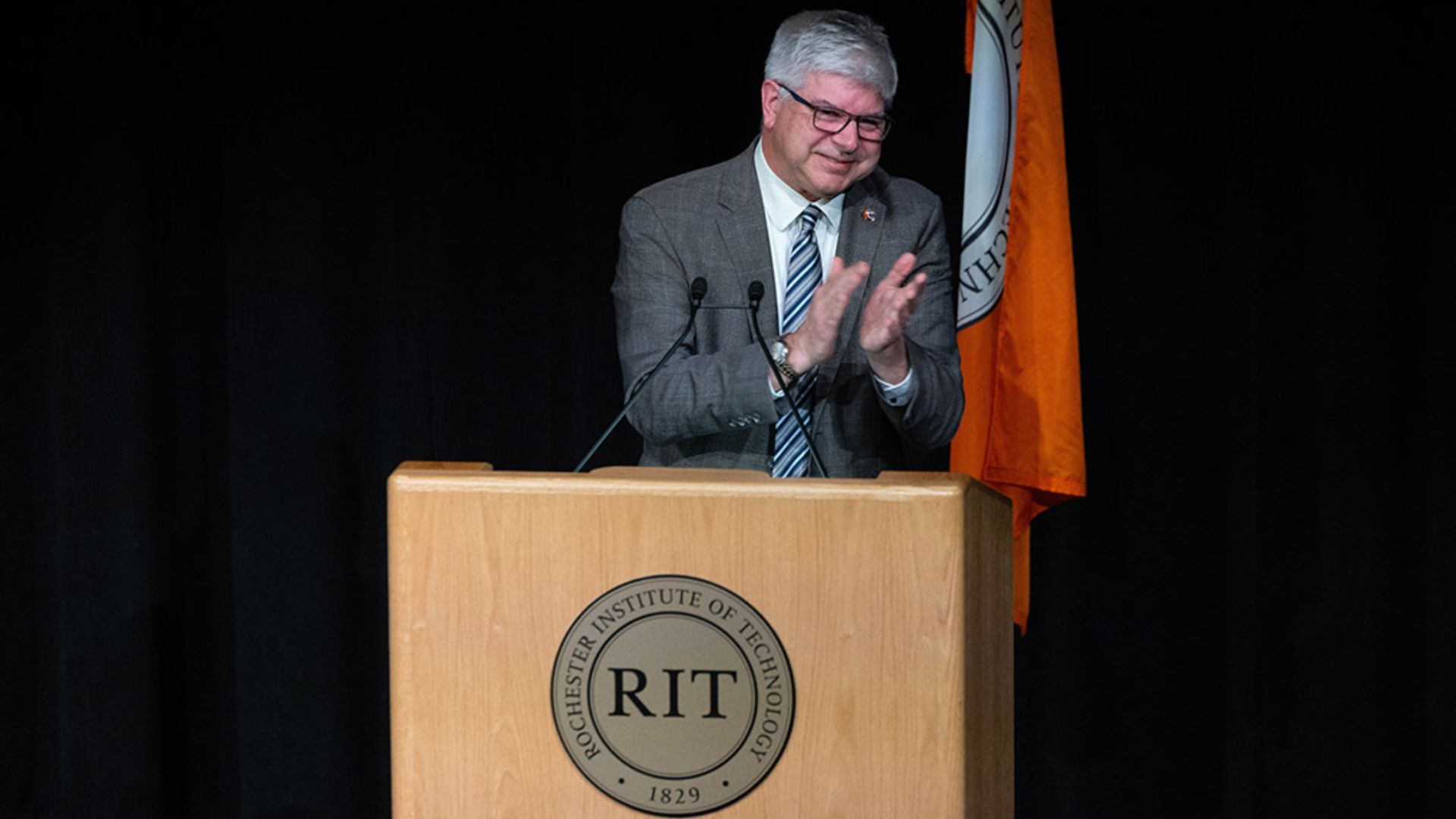Local News
President Sanders delivers his first State of the University Address highlighting record achievements and ambitious plans for the future of RIT

Rochester, New York – Rochester Institute of Technology marked a milestone moment this week as President Bill Sanders delivered his first State of the University Address since taking office this summer. Standing before faculty, staff, and students inside Ingle Auditorium, Sanders struck a tone of optimism, framing RIT as a university not just weathering the turbulence facing higher education but actively leading the way forward.
Despite acknowledging the mounting challenges that colleges and universities face nationwide—from financial pressures to questions about the value of higher education—Sanders made it clear that he sees RIT as uniquely positioned to thrive. “Through strategic actions and a visionary approach, we are positioning ourselves not simply to weather the uncertainty but to stay ahead of it and lead,” Sanders said. “We will do this by thinking strategically, acting on our aspirations, being willing to make difficult choices, and being nimble. We will do all of these things while remaining true to our community’s values.”
Sanders, who officially became RIT’s 11th president on July 1, used the address to highlight both achievements from the past year and the ambitious plans that lie ahead. He pointed to record-breaking successes in research funding and philanthropy as well as enrollment numbers that reflect RIT’s growing international reach. In fiscal year 2025, the university secured an unprecedented $105 million in new sponsored research funding, a figure that underscores RIT’s expanding influence in cutting-edge fields.
Enrollment also demonstrated strength. This fall, more than 3,000 new undergraduates joined the campus in Rochester, alongside 471 master’s students and 110 Ph.D. candidates. The global footprint of RIT was evident as well, with more students than ever enrolling at its international campuses in Dubai, Croatia, and Kosovo. In total, the university now maintains 103 active partnerships across 53 countries, further cementing its role as a global destination for learning and research.
Philanthropy played a prominent role in Sanders’ remarks. He noted that RIT had a record fundraising year, with $46.8 million in new gift commitments. Among the most visible results of donor support is the naming of the new Tiger Stadium. Thanks to a major contribution from the Pike and Judson families, the $30 million facility will be known as the Thomas Fearey Judson Jr. Stadium, a tribute to a legacy of generosity that will benefit students and the community for years to come.
While celebrating these successes, Sanders shifted the focus to the future, outlining the university’s ongoing work on a comprehensive strategic framework. This effort, he explained, will redefine RIT’s mission and vision, clarify its core values, and set ambitious goals to guide the institution in the coming years. The framework is organized around four pillars: transformative student experiences and success; world-changing research and scholarship; community wellbeing and belonging; and a global reach and mindset.
“The success of this strategic framework process depends on the collective wisdom and creativity of our entire community so we may all thrive,” Sanders said. “We are well positioned to re-invent the future.”
The address was not just about numbers and initiatives; it was also about reaffirming the identity of RIT as a place where innovation, creativity, and resilience converge. Sanders invited faculty, staff, and students to take an active role in shaping the next chapter of the university’s story. “Our university community is on to something that is truly exceptional,” he said. “I want to make sure RIT continues to be a place where all can explore boldly, fail safely, and succeed spectacularly.”
The event also included reflections from other university leaders, who reinforced the themes of collaboration and shared purpose. Provost and Senior Vice President for Academic Affairs Prabu David spoke on the role of academic innovation in RIT’s growth. Faculty Senate Chair Richard Zanibbi and Staff Council Vice Chair Jeremy Zehr addressed governance and staff engagement, while Student Government President Rafael Gilboa provided the student perspective. Keith Jenkins, Vice President and Associate Provost for Access, Engagement, and Success, underscored the importance of inclusion and belonging in strengthening the community.
For many in attendance, Sanders’ address was both a reassurance and a call to action. It painted a picture of a university proud of its accomplishments but restless to push further—whether through groundbreaking research, global partnerships, or a renewed commitment to student success.
As the university continues its work on the strategic framework, the message was clear: RIT is not simply adapting to change but preparing to define it. With Sanders at the helm, the institution intends to embrace risk, pursue bold ideas, and ensure that students, faculty, and staff have the tools to thrive in an era of disruption.
In his closing remarks, Sanders emphasized that the future of the university will be shaped by its people—creators, makers, innovators, teachers, researchers, and entrepreneurs—who will chart a course that is both ambitious and grounded in the community’s shared values. For RIT, the State of the University was not just a reflection on where it stands but a declaration of where it intends to go.

-

 Local News12 months ago
Local News12 months agoNew ALDI store close to Rochester to begin construction in late 2025 or early 2026
-

 Local News12 months ago
Local News12 months agoRochester Lilac Festival announces exciting 127th edition headliners
-

 Local News10 months ago
Local News10 months agoCounty Executive Adam Bello and members of the county legislature celebrate exceptional young leaders and advocates at the 2025 Monroe County Youth Awards
-

 Local News10 months ago
Local News10 months agoThe 2025 Public Market Food Truck Rodeo series will begin this Wednesday with live music by the Royal Bromleys